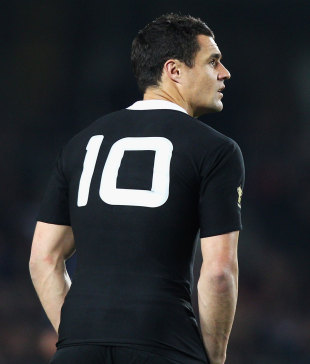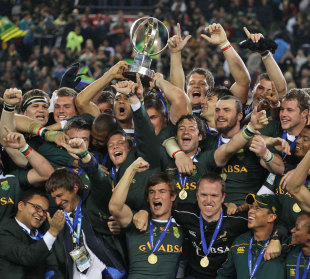|
Aviva Premiership
The Relationship Game
Graham Jenkins
September 6, 2012

All Blacks playmaker Dan Carter, arguably rugby union's biggest star, put pen to paper on a new four-year deal with the New Zealand Rugby Union last year to underline his status as the sport's most valuable commodity
© Getty Images
Enlarge
"You are nowhere if you know no one." That succinct, Dicky Fox-esque sound bite sums up one of the less-chronicled areas of the game and highlights the demands of what on the face of it appears a glamorous line of business but in truth is as cut-throat as the battle set to be played out for Aviva Premiership glory. Welcome to the world of a rugby player agent. The dust is just settling on a busy off-season punctuated by transfers at all levels of the game with countless agents, lured by the commercial potential, helping to pave the way for those moves and in doing so service their clients, the clubs and the game in general. "The battle for players is fierce," reveals Tim Lopez, Head of Rugby and a key cog within one of the major players in the industry - Essentially - a global operation that spans offices in London, France, New Zealand, Australia, Japan and South Africa and boasts an enviable client list including the likes of All Blacks stars Richie McCaw and Dan Carter and home-grown talent such as England's Courtney Lawes and Wales' Leigh Halfpenny. Lopez, who boasts nearly a decade's experience in the game and is the only agent in world rugby licenced to work in the UK as well as France and Italy, is speaking at his London HQ that is also home to a delightfully rudimentary whiteboard offering an enviable map of the European game. Division by division and club by club, the requirements of every side are laid bare for his team of four agents who are each responsible for 20-30 elite players including those overseas players furthering their career in the UK as a result of the efforts of Essentially's global network. But Lopez is keen to stress this is not a numbers game. "It's not the amount of players you have on your books but the amount of players per agent," he said. A more significant ratio is the one between clubs and players. The all-encompassing global economic downturn has cast an imposing shadow over the game in recent years and desperate times call for desperate measures. Players offering their services for free in the hope of earning a permanent deal is not uncommon with budget-wary clubs wielding increasing power. "We have found in the last three or four season that it has become more of a clubs market," explains Lopez. "Clubs are a lot more careful in how they spend their money and the net effect of smaller squad sizes is more players on the open market. Previously clubs would look to start recruiting at the turn of the year but now they can afford to hang on later and later. While they will still want to be the first cab off the rank when signing an All Black international, when it comes to your Premiership stalwart we are seeing clubs doing deals in May, June and July which not long ago would have been unheard of." That pressure makes securing and nurturing the most promising talent all the more important when again it is matter of who you know and not just what you know. "I'm no Level 4 or 5 accredited coach so I would never deem my opinion of a player more accurate than a Stuart Lancaster or whoever," said Lopez, "but what you do have is a basic grasp. You use your own sense of judgement but then you use people you know who are good judges of players and are able not only to point out players a who are worth becoming involved with but do it before anyone else which is key.
"And you are having to look at players at a younger age than ever before. I started working with the likes of Dan Biggar and Leigh Halfpenny on the back of the 2008 IRB Junior World Championship and it was relatively easy and at about the same time I linked up Courtney Lawes. In contrast, virtually all of our competitors had an agent at this year's Junior World Championship in South Africa and the majority of the players in the top teams are already spoken for." Admittedly there is no money in the signing of young players - it is "poor business model" according to Lopez and a gamble that agents hope will pay off under their guidance in the years that follow. That relationship will see the agent fulfil every need. "There will be those players who will ring up to say they have been dumped by their girlfriend while for others it will be much more functional. I'm not a marriage guidance counsellor, but you build such a relationship that players will open up to you on different levels. "We want to be a one-stop shop for them to use if they need anything. We get paid a percentage of the player's contract but you can't just disappear after that, it is a relationship game. "The non glamorous bit we do is the sourcing of contracts, we will make sure the player has a job, the most important part of our job, and hope the contract is as favourable and well thought through as possible. Some people forget that is what we are here to do fundamentally. In addition we offer other services, legal advice, financial advice, in-house accountancy, a dedicated commercial division and player services." One relatively new area that both players and their agents are keen to leverage is the ever-growing world of Twitter. Essentially client Carter has racked up over 40,000 followers since joining the micro-blogging site just last week - still some way short of the 607,000 or so boasted by Wallabies rival and Twitter devotee Quade Cooper. "People want to be associated with successful people and Twitter has taken that to a new level. There is significant commercial value attached to a player with say 50,000 followers on Twitter," explained Lopez. "If you can get a player to Tweet his 100,000 followers and 1,000 of them buy the product you clearly have a powerful marketing tool." Twitter regulars will be no strangers to blatant product placement by players with a certain chicken restaurant the subject of endless Tweets. "The problem with some of this player services stuff is that there are some agencies that have taken their eye off the ball and stopped offering the bread and butter services and now it's more about how many black cards you can get for Nandos. It's sad that some players will be impressed by that and might go with an agency that does not have expertise or backbone but will have the ability to get them a free half chicken."

South Africa celebrate winning the 2012 IRB Junior World Championship where the majority of the players with the top teams are already spoken for when it comes to agent representation
© Getty Images
Enlarge
While most players are looking to take the next challenge in their career, for many others last season signalled the end of the road. Whether out of choice, or more worryingly enforced through injury, the move into retirement can be even more daunting than any taken during their playing days. For some the step may be easier than others but it is not one they should be taking alone according to Lopez. The professional era continues to take a toll and there are only so many coaching, TV and 'ambassador' roles available to players left without the daily grind of rugby come their mid-30s. "We work very closely with the RPA and at the end of the day you want to sleep at night and know that you have done everything you can for a player to make sure that transition from earning £150,000 down to nothing or £50,000 or whatever is as painless as possible," he said. "But you can only lead a horse to water. There will be players for who it will come as a big shock when they do hang up their boots. That can be an upsetting scenario but you work as hard as possible to make sure that that happens infrequently. "A few times a year a player is going to find that suddenly they are not fit, are injured, not getting picked or able to find a club and unfortunately compromise agreements where players are let go before the end of their contract do happen. Scrabbling around trying to help them find something is part of what we do, but if it is planned in advance and the players are amenable to it then it is not such a shock the day it does happen and they have a Plan B. "Ultimately you have a duty of care to the players and selfishly you want them to say that you have done a good job. Not only did they do my contracts well when I was a player but they looked after me when I hung up my boots." It is a commitment to player welfare of which Dicky Fox himself would be proud. © ESPN Sports Media Ltd. Graham Jenkins is the Senior Editor of ESPNscrum and you can also follow him on Twitter.
| |||||||||||||||
Live Sports
Communication error please reload the page.
-
Football
-
Cricket
-
Rugby
-
- Days
- Hrs
- Mins
- Secs
F1 - Abu Dhabi GP
Abu Dhabi Grand Prix December 11-131. Max Verstappen ()
2. Valtteri Bottas (Mercedes)
3. Lewis Hamilton (Mercedes)
4. Alexander Albon ()
5. Lando Norris ()
6. Carlos Sainz Jr ()
-
ESPNOtherLive >>
Golf - Houston Open
Snooker - China Open
Tennis - Miami Open

